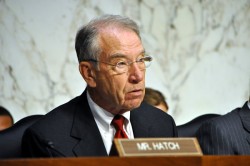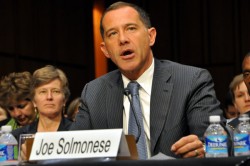National
Couples make history testifying against DOMA
Senate hears from spouses, activists about burdens of marriage ban; hearing first-ever in Congress on repeal of anti-gay law
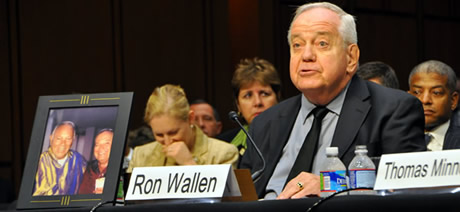
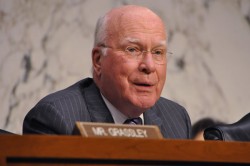
‘The time has come for the federal government to recognize that these married couples deserve the same legal protections afforded to opposite-sex married couples,’ said Sen. Patrick Leahy (D-Vt.) (Washington Blade photo by Michael Key)
A Senate hearing Wednesday on repealing the Defense of Marriage Act featured poignant testimony from couples in same-sex marriages, who described how the anti-gay law has harmed them.
The hearing, which took place before the Senate Judiciary Committee, was the first ever before Congress on repeal of DOMA, the 1996 law prohibiting federal recognition of same-sex marriage. The hearing was intended to highlight the Respect for Marriage Act, legislation pending before Congress that would repeal DOMA.
Ron Wallen, an Indio. Calif., resident, who married his partner of 55 years in 2008, said he’s unable to make payments on his home following the death of his spouse, Tom Carrollo, four months ago. Had he been in an opposite-sex marriage, he would have been able to receive Social Security benefits to help pay for the cost of living.
“I am selling the last house I shared with my husband in a panic sale because I can’t afford the mortgage and expenses,” Wallen said. “I am spending my days and nights sorting through our possessions, packing boxes to move — even while I am still answering the condolence cards that come in the mail.”
Susan Murray, who lives in Ferrisburgh, Vt., with her spouse, Karen Murray, said she also faces financial inequities as a result of DOMA. Murray was the co-counsel in the lawsuit Baker v. Vermont, which established civil unions in Vermont in 2000.
One issue Murray cited was the additional tax that she and her spouse have to pay on employer-based insurance coverage provided to them through her spouse’s employer, Fletcher Allen Health Care.
“Because of DOMA, I am not considered Karen’s spouse, so the value of that health insurance coverage for me ($6,200 a year) is considered taxable income to Karen,” Murray said. “She therefore has to pay income tax, as well as FICA and Medicare tax, on that ‘phantom’ income — unlike her other married colleagues.”
Andrew Sorbo, a Cheshire, Conn., resident and retired history teacher, also testified about financial troubles he faced after his spouse, Colin Atterbury, died of pancreatic cancer in 2009. Among other things, Sorbo said he was denied the right to be included in his deceased spouse’s medical insurance plan through the federal government.
“When I retired as a teacher in 2005, I had no alternative except to pay for my insurance coverage in full through my former school district, at a much higher cost than if I could have been covered under Colin’s plan as a spouse,” Sorbo said. “Last year, my insurance payments consumed almost a third of my $24,000 teacher pension.”
Sen. Patrick Leahy (D-Vt.), chair of the committee, spoke out in his opening statement for passage of the Respect for Marriage Act and said it would allow same-sex couples married under state law to receive federal benefits.
“Nothing in this bill would obligate any person, religious organization, state, or locality to perform a marriage between two persons of the same sex,” Leahy said. “What would change, and what must change, is the federal government’s treatment of state-sanctioned marriage. The time has come for the federal government to recognize that these married couples deserve the same legal protections afforded to opposite-sex married couples.”
Sen. Dianne Feinstein (D-Calif.), sponsor of the DOMA repeal legislation, maintained that the anti-gay law should be off the books because marriage, as well as other issues related to family such as adoption and divorce, have been under the jurisdiction of state law.
“Family law has traditionally been the preserve of state law,” Feinstein said. “The single exception is DOMA. Chief Justice [William] Rehnquist once wrote that family law ‘has been left to the states from time immemorial, and not without good reason.’ He was right.”
Passed by Congress in 1996, DOMA was signed into law by President Clinton. Both Clinton and the bill’s sponsor at the time, former Republican Rep. Bob Barr, have come out for repeal of the law.
DOMA has two components: one that prohibits the federal government from recognizing same-sex marriage and another that allows states not to recognize such marriages performed in other jurisdictions.
As a result of the component of DOMA known as Section 3, married same-sex couples cannot participate in federal programs. For instance, they can’t file joint federal income taxes, receive spousal benefits under Social Security or obtain exemptions of the estate tax law upon the death of one of the spouses.
Sen. Chuck Schumer (D-N.Y.), who represents a state where same-sex marriage will be available next week, emphasized the fiscal reasons for repealing DOMA and predicted that lifting the anti-gay law from the books “would, on balance, likely increase federal revenue.”
According to Schumer, in 2004 the Congressional Budget Office found that DOMA repeal at the time would have increased revenues by less than $400 million a year from 2005 through 2010, and by $500 million to $700 million annually from 2011 through 2014.
“I think that there are three fundamental principles at stake here,” Schumer continued. “Repealing DOMA makes good fiscal sense, it respects states’ rights to make their own determinations about marriage, and it treats all married people the same. It’s fair, it makes sense, and it’s time.”
The sole committee member to speak out against DOMA repeal during the hearing was Sen. Charles Grassley (R-Iowa), ranking Republican on the committee.
Grassley, who represents a state where same-sex marriage is legal, said he opposes the Respect for Marriage Act because he believes marriage should be reserved for one man and one woman.
“The bill before us today is entitled the Respect for Marriage Act,” Grassley said. “George Orwell would have marveled at the time. A bill to restore marriage would restore marriage as it has been known — one man, one woman. That is the view of marriage that I support. This bill would undermine, not restore marriage by repealing it.”
Grassley and Sen. Orrin Hatch (R-Utah) were the only Republican senators who made an appearance at the DOMA hearing. Grassley was the only GOP committee member who asked questions of the witnesses.
Witnesses who married someone of the same-sex testified about how DOMA negatively affected their relationship or their ability to receive benefits after the death of their spouse.
The hearing took place on the heels of an announcement from White House Press Secretary Jay Carney on Tuesday that President Obama supports the Respect for Marriage Act.
“I can tell you that the president has long called for legislative repeal of the so-called Defense of Marriage Act, which continues to have a real impact on the lives of real people families, friends and neighbors,” Carney said. “He is proud to support the Respect for Marriage Act introduced by Sen. Feinstein and Congressman Nadler, which would take DOMA off the books once and for all. This legislation would uphold the principle that the federal government should not deny gay and lesbian the same rights and legal protections as straight couples.”
President Obama has previously said he supports legislative repeal of the Defense of Marriage Act, but has yet to come out in support of the Respect for Marriage Act, which is the specific measure pending before Congress that would repeal the law.
During the hearing, Grassley erroneously said that Obama until Tuesday “was a supporter of DOMA.” During the 2008 campaign, Obama made full repeal of DOMA one of his campaign promises.
Experts testify before Senate
House members also testified on both sides of the Respect for Marriage Act. Two Democratic members — Reps. Jerrold Nadler (D-N.Y.), the sponsor of the bill, and John Lewis (D-Ga.) — favored DOMA repeal, while Rep. Steve King (R-Iowa), a lawmaker known for his anti-gay views, opposed it.
Nadler maintained that not just same-sex couples — but children being raised by LGBT parents — are among those who are affected by the discrimination of DOMA.
“No legitimate federal interest in the welfare of children is ever advanced by withholding protection for some children based on the desire to express mild disapproval of their parents,” Nadler said. “It defies common sense to claim that it’s necessary to harm or exclude the children of married same-sex couples in order to somehow protect the children of opposite-sex couples.”
Similarly, Lewis expressed disbelief that Congress has yet to act on something as fundamental as allowing Americans the right to marry the person they choose.
“I find it hard to believe that in the year 2011, there’s still the need to hold hearings and debate on whether or not to allow people to marry the one they love,” Lewis said.
Lewis said DOMA imposes similar discrimination that blacks endured in the South under segregation and recalled the discrimination he faced as a child growing up in Southern Alabama.
“As a child, I tasted the bitter fruits and racism and discrimination, and I did not like it,” Lewis said. “And in 1996, when Congress passed the Defense of Marriage Act, the taste of that old bitter fruit filled my mouth once again.”
King, countering those arguments, based his testimony against repeal of DOMA on the basis that marriage is intended for procreation and thus should be reserved for one man and one woman because the union can produce children.
“The other side argues that you can’t choose who you love and that the union between two men and two women is equal to that of one man and one woman,” King said. “These are the same arguments that are used to promote marriage between fathers and daughters, mothers and sons or even polygamous relationships.”
Expert witnesses on both sides of DOMA testified before lawmakers. LGBT advocates maintained DOMA should be repealed to lift the burden of discrimination against same-sex couples, while supporters of DOMA said the anti-gay law is necessary to keep marriage as between one man and one woman.
Joe Solmonese, president of the Human Rights Campaign, was among the LGBT advocates who testified during the hearing. He addressed the financial burdens DOMA imposes on same-sex couples.
“DOMA means that the many protections the federal government provides for the health and financial security of American families remain out of reach for same-sex couples and their children,” Solmonese said. “Same-sex spouses of federal employees and active members of the military are denied access to health insurance coverage and a host of other benefits. Even when private sector companies voluntarily provide spousal health benefits, they are taxed, making it financially burdensome if not impossible for gay and lesbian couples to make use of these fair-minded policies.”
Evan Wolfson, president of Freedom to Marry, said DOMA “carves out a gay exception” in the way the U.S. government traditionally and currently treats married couples.
“DOMA divides those married at the state level into first-class marriages for those the federal government prefers and second-class marriages for those the federal government doesn’t like,” Wolfson said. “But in America, we don’t have second-class citizens, and we shouldn’t have second-class marriages either.”
Arguing in favor of DOMA, anti-gay advocates maintained the importance of keeping marriage between one man and one woman.
Austin Nimrocks, senior legal counsel for the Alliance Defense Fund, said the purpose of family and relationships is to procreate and raise children.
“Accordingly, from the lexicographers who have defined marriage, to the eminent scholars in every relevant academic discipline who have explained marriage, to the legislatures and courts that have given legal recognition and effect to marriage, they all demonstrate that an animating purpose of marriage in every society is to increase the likelihood that procreative relationships benefit society,” Nimrocks said. “Marriage between a man and a woman is a long standing, world-wide idea that is a building block of society.”
Edward Whelan, president of the Ethics & Public Policy Center, warned that DOMA repeal could require the federal government to recognize not only same-sex marriages — but also polygamous relationships.
“If the male-female nature of traditional marriage can be dismissed as an artifact and its inherent link to procreation denied, then surely the distinction between a marriage of two persons and a marriage of three or more is all the more arbitrary and irrational,” Whelan said. “It’s doubtful that any further sliding down the slippery slope would be necessary to get to polyamory: unlike the novelty of same-sex marriage, the polygamous version of polyamory has been widely practiced throughout history — and is therefore arguably up the slope from same-sex marriage.”
Whelan previously testified in April against same-sex marriage before the Republican-controlled House Judiciary Subcommittee on the Constitution hearing on “Defending Marriage.”
The assertion that DOMA would institute same-sex marriage is places where it didn’t exist before didn’t go without criticism from LGBT advocates after the hearing.
Rick Jacobs, chair and co-founder of the Courage Campaign, rebuked the assertion during that DOMA repeal would expand the places where gay couples can marry and maintained the Defense of Marriage Act would simply remove the federal government from the marriage issue.
“They don’t seem to understand what DOMA is,” Jacobs said. “They just keep missing the point that all DOMA is give the states the ability to decide what marriage is.”
Mary Bonauto, civil rights projects director for Gay & Lesbian Advocates & Defenders, also chided anti-gay advocates’ emphasis on marriage as between one man, one woman during the hearing as she said DOMA only affects those who are already married.
“I think it’s important to talk about marriage, but I wish there had been that much more delineation between what marriage is about one hand and what DOMA does, which is simply discriminate against people who are already married,” Bonauto said. “But there’s still, particularly in the opposition witnesses, this complete conflation between DOMA and marriage.”
Tom Minnery, vice president of public policy for Focus on the Family, bore the brunt of the tough questioning from the committee undermining his credibility for his position that children reared by opposite-sex parents are better off than those raised by same-sex parents.
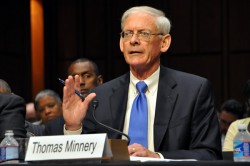
Tom Minnery, vice president of public policy for Focus on the Family (Washington Blade photo by Michael Key)
“It is a strong and dramatically consistent finding in the social science, psychological and medical literature that children do best when living with their own married mother and father,” Minnery said.
In his testimony, Minnery cites a December 2010 study from the Department of Health & Human Services which he said found “children living with their own married biological or adoptive mothers and fathers were generally healthier and happier, had better access to health care, less likely to suffer mild or severe emotional problems, did better in school, were protected from physical, emotional and sexual abuse and almost never life in poverty, compared with children in any other family form.”
Sen. Al Franken (D-Minn.) challenged Minnery’s assertion, saying the HHS report “actually doesn’t say what you said it says.”
“It says that nuclear families — not opposite-sex married families — are associated with those positive outcomes,” Franken said. “Isn’t it true, Mr. Minnery, that married same-sex couple that has or had adopted kids would fall under the definition of the nuclear family in the study that you cite?”
Minnery replied that he would believe the study means nuclear families are families with opposite-sex parents, but Franken denied this speculation, saying, “It doesn’t,” eliciting laugher from those attending the hearing.
“The study defines nuclear family as one or more children living with two parents who are married to one another and each biological or adoptive parents of all the children in the family,” Franken said. “And I, frankly, don’t really know how we can trust the rest of your testimony if you are reading studies these ways.”
Rea Carey, executive director of the National Gay & Lesbian Task Force, said following the hearing the testimony of those affected by DOMA compared to apparently misleading testimony of the anti-gay law’s proponents shows why “we’re winning on this issue.”
“The families who spoke — they talked from their human experience,” Carey said. “The other side talked from technical matters, from research that actually didn’t reveal the true, full research. We’re actually — children are doing quite well in our families, thank you very much.”
Time for a markup?
Now that the Respect for Marriage Act has had a hearing in the Senate, one option to move the legislation would be to hold a markup to bring the legislation to the floor. All 10 Democrats on the committee have signaled support for the legislation, so the bill already has sufficient support to move forward.
A Senate Democratic aide, who spoke on condition of anonymity, said the committee has yet to set a date to report out the legislation to the Senate floor.
“This hearing began to build the record for repealing DOMA, and this is the beginning of the process,” the aide said. “Sen. Leahy will continue to work with Sen. Feinstein and other supporters, and hopes there will be support from both sides of the aisle for this repeal, but I have no announcements to make today concerning any kind of timeline.”
Jacobs said he wants to see more co-sponsors for the Respect for Marriage Act — and maintained he wants “all Democrats on board” — but said the time may be right for a markup on the bill.
“I think that we should move to that pretty quickly,” Jacobs said. “I’d like to see it. I know some people don’t, but I think we need to keep the momentum going.”
Following the hearing, Solmonese expressed caution about moving to a markup and deferred the decision to the Senate Judiciary Committee leadership.
“If we are genuinely committed to a clare path to victory, to ensuring that DOMA is repealed, then I would defer to the chairman in terms of the degree to which he thinks the time is appropriate for a markup — and how that relates to a full Senate vote and the prospects in the House,” Solmonese said. “As was the case with ‘Don’t Ask, Don’t Tell,’ as was the case with any legislative victory that we have seen through to the end, we never want to evaluate it on the merits of one action.”
Bonauto, who’s leading several lawsuits against DOMA in the federal courts, said she isn’t sure if a committee vote on DOMA repeal — or a floor vote in the Senate without action in the House — would have any effect on how the courts would evaluate the constitutionality of the anti-gay law. She cautioned that a symbolic victory in the Senate may not have the desired impact on the courts.
“It’s hard to predict,” Bonauto said. “In the 1970’s, when the Congress had approved of the Equal Rights Amendment and sent it up for ratification to the states, the Supreme Court stayed its hand and didn’t declare that gender was a suspect classification because it thought the issue was moving through the political process. I think we’ve all learned through of the failure of ratification of the ERA that because something has been approved by the Congress of even is a constitutional amendment is set forth for ratification, it doesn’t predict future results.”
The White House
Four states to ignore new Title IX rules protecting transgender students
Biden administration last Friday released final regulations

BY ERIN REED | Last Friday, the Biden administration released its final Title IX rules, which include protections for LGBTQ students by clarifying that Title IX forbids discrimination based on sexual orientation and gender identity.
The rule change could have a significant impact as it would supersede bathroom bans and other discriminatory policies that have become increasingly common in Republican states within the U.S.
As of Thursday morning, however, officials in at least four states — Oklahoma, Louisiana, Florida, and South Carolina — have directed schools to ignore the regulations, potentially setting up a federal showdown that may ultimately end up in a protracted court battle in the lead-up to the 2024 elections.
Louisiana State Superintendent of Education Cade Brumley was the first to respond, decrying the fact that the new Title IX regulations could block teachers and other students from exercising what has been dubbed by some a “right to bully” transgender students by using their old names and pronouns intentionally.
Asserting that Title IX law does not protect trans and queer students, Brumley states that schools “should not alter policies or procedures at this time.” Critically, several courts have ruled that trans and queer students are protected by Title IX, including the 4th U.S. Circuit Court of Appeals in a recent case in West Virginia.
In South Carolina, Schools Supt. Ellen Weaver wrote in a letter that providing protections for trans and LGBTQ students under Title IX “would rescind 50 years of progress and equality of opportunity by putting girls and women at a disadvantage in the educational arena,” apparently leaving trans kids out of her definition of those who deserve progress and equality of opportunity.
She then directed schools to ignore the new directive while waiting for court challenges. While South Carolina does not have a bathroom ban or statewide “Don’t Say Gay or Trans” law, such bills continue to be proposed in the state.
Responding to the South Carolina letter, Chase Glenn of Alliance For Full Acceptance stated, “While Supt. Weaver may not personally support the rights of LGBTQ+ students, she has the responsibility as the top school leader in our state to ensure that all students have equal rights and protections, and a safe place to learn and be themselves. The flagrant disregard shown for the Title IX rule tells me that our superintendent unfortunately does not have the best interests of all students in mind.”
Florida Education Commissioner Manny Diaz also joined in instructing schools not to implement Title IX regulations. In a letter issued to area schools, Diaz stated that the new Title IX regulations were tantamount to “gaslighting the country into believing that biological sex no longer has any meaning.”
Governor Ron DeSantis approved of the letter and stated that Florida “will not comply.” Florida has notably been the site of some of the most viciously anti-queer and anti-trans legislation in recent history, including a “Don’t Say Gay or Trans” law that was used to force a trans female teacher to go by “Mr.”
State Education Supt. Ryan Walters of Oklahoma was the latest to echo similar sentiments. Walters has recently appointed the right-wing media figure Chaya Raichik of Libs of TikTok to an advisory role “to improve school safety,” and notably, Raichik has posed proudly with papers accusing her of instigating bomb threats with her incendiary posts about LGBTQ people in classrooms.
The Title IX policies have been universally applauded by large LGBTQ rights organizations in the U.S. Lambda Legal, a key figure in fighting anti-LGBTQ legislation nationwide, said that the regulations “clearly cover LGBTQ+ students, as well as survivors and pregnant and parenting students across race and gender identity.” The Human Rights Campaign also praised the rule, stating, “rule will be life-changing for so many LGBTQ+ youth and help ensure LGBTQ+ students can receive the same educational experience as their peers: Going to dances, safely using the restroom, and writing stories that tell the truth about their own lives.”
The rule is slated to go into effect Aug. 1, pending any legal challenges.
****************************************************************************

Erin Reed is a transgender woman (she/her pronouns) and researcher who tracks anti-LGBTQ+ legislation around the world and helps people become better advocates for their queer family, friends, colleagues, and community. Reed also is a social media consultant and public speaker.
******************************************************************************************
The preceding article was first published at Erin In The Morning and is republished with permission.
Pennsylvania
Malcolm Kenyatta could become the first LGBTQ statewide elected official in Pa.
State lawmaker a prominent Biden-Harris 2024 reelection campaign surrogate

Following his win in the Democratic primary contest on Wednesday, Pennsylvania state Rep. Malcolm Kenyatta, who is running for auditor general, is positioned to potentially become the first openly LGBTQ elected official serving the commonwealth.
In a statement celebrating his victory, LGBTQ+ Victory Fund President Annise Parker said, “Pennsylvanians trust Malcolm Kenyatta to be their watchdog as auditor general because that’s exactly what he’s been as a legislator.”
“LGBTQ+ Victory Fund is all in for Malcolm, because we know he has the experience to win this race and carry on his fight for students, seniors and workers as Pennsylvania’s auditor general,” she said.
Parker added, “LGBTQ+ Americans are severely underrepresented in public office and the numbers are even worse for Black LGBTQ+ representation. I look forward to doing everything I can to mobilize LGBTQ+ Pennsylvanians and our allies to get out and vote for Malcolm this November so we can make history.”
In April 2023, Kenyatta was appointed by the White House to serve as director of the Presidential Advisory Commission on Advancing Educational Equity, Excellence and Economic Opportunity for Black Americans.
He has been an active surrogate in the Biden-Harris 2024 reelection campaign.
The White House
White House debuts action plan targeting pollutants in drinking water
Same-sex couples face higher risk from environmental hazards

Headlining an Earth Day event in Northern Virginia’s Prince William Forest on Monday, President Joe Biden announced the disbursement of $7 billion in new grants for solar projects and warned of his Republican opponent’s plans to roll back the progress his administration has made toward addressing the harms of climate change.
The administration has led more than 500 programs geared toward communities most impacted by health and safety hazards like pollution and extreme weather events.
In a statement to the Washington Blade on Wednesday, Brenda Mallory, chair of the White House Council on Environmental Quality, said, “President Biden is leading the most ambitious climate, conservation, and environmental justice agenda in history — and that means working toward a future where all people can breathe clean air, drink clean water, and live in a healthy community.”
“This Earth Week, the Biden-Harris Administration announced $7 billion in solar energy projects for over 900,000 households in disadvantaged communities while creating hundreds of thousands of clean energy jobs, which are being made more accessible by the American Climate Corps,” she said. “President Biden is delivering on his promise to help protect all communities from the impacts of climate change — including the LGBTQI+ community — and that we leave no community behind as we build an equitable and inclusive clean energy economy for all.”
Recent milestones in the administration’s climate policies include the U.S. Environmental Protection Agency’s issuance on April 10 of legally enforceable standard for detecting and treating drinking water contaminated with polyfluoroalkyl substances.
“This rule sets health safeguards and will require public water systems to monitor and reduce the levels of PFAS in our nation’s drinking water, and notify the public of any exceedances of those levels,” according to a White House fact sheet. “The rule sets drinking water limits for five individual PFAS, including the most frequently found PFOA and PFOS.”
The move is expected to protect 100 million Americans from exposure to the “forever chemicals,” which have been linked to severe health problems including cancers, liver and heart damage, and developmental impacts in children.
An interactive dashboard from the United States Geological Survey shows the concentrations of polyfluoroalkyl substances in tapwater are highest in urban areas with dense populations, including cities like New York and Los Angeles.
During Biden’s tenure, the federal government has launched more than 500 programs that are geared toward investing in the communities most impacted by climate change, whether the harms may arise from chemical pollutants, extreme weather events, or other causes.
New research by the Williams Institute at the UCLA School of Law found that because LGBTQ Americans are likelier to live in coastal areas and densely populated cities, households with same-sex couples are likelier to experience the adverse effects of climate change.
The report notes that previous research, including a study that used “national Census data on same-sex households by census tract combined with data on hazardous air pollutants (HAPs) from the National Air Toxics Assessment” to model “the relationship between same-sex households and risk of cancer and respiratory illness” found “that higher prevalence of same-sex households is associated with higher risks for these diseases.”
“Climate change action plans at federal, state, and local levels, including disaster preparedness, response, and recovery plans, must be inclusive and address the specific needs and vulnerabilities facing LGBT people,” the Williams Institute wrote.
With respect to polyfluoroalkyl substances, the EPA’s adoption of new standards follows other federal actions undertaken during the Biden-Harris administration to protect firefighters and healthcare workers, test for and clean up pollution, and phase out or reduce use of the chemicals in fire suppressants, food packaging, and federal procurement.
-

 District of Columbia3 days ago
District of Columbia3 days agoCatching up with the asexuals and aromantics of D.C.
-

 South America3 days ago
South America3 days agoArgentina government dismisses transgender public sector employees
-

 Maine4 days ago
Maine4 days agoMaine governor signs transgender, abortion sanctuary bill into law
-

 District of Columbia4 days ago
District of Columbia4 days agoBowser budget proposal calls for $5.25 million for 2025 World Pride


